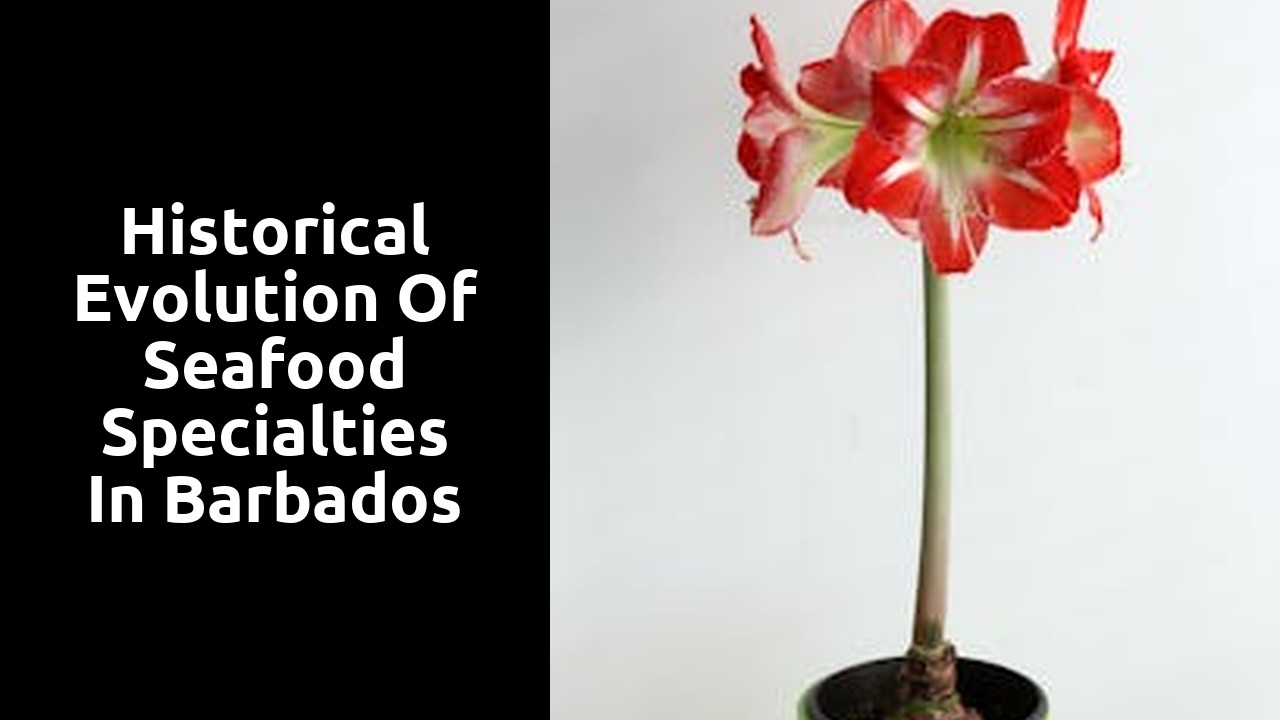Historical evolution of seafood specialties in Barbados

Sustainable Fishing Practices in Barbados
Barbados has a rich history of fishing, with the sustainability of its marine resources playing a pivotal role in the island's culture and economy. The Barbadian government, in partnership with local fishing communities, has implemented strict regulations to ensure that fishing practices are environmentally responsible and not detrimental to the delicate marine ecosystem. These efforts aim to preserve the abundance of marine life for present and future generations, reflecting the commitment to sustainable fishing practices in Barbados.
Fishermen in Barbados adhere to size and catch limits set by authorities to prevent overfishing and preserve fish populations. Additionally, there are designated marine protected areas where fishing is restricted to allow fish stocks to replenish and habitats to thrive. The focus on sustainable fishing practices not only safeguards the environment but also ensures a continued supply of fresh seafood for local consumption and export, highlighting the importance of striking a balance between economic interests and environmental conservation in Barbados.
Conservation Efforts and Regulations
Ensuring the sustainability of Barbados' marine resources is a top priority for the government and local communities. Regulations have been put in place to protect vulnerable species and habitats, as well as to control fishing practices to prevent overexploitation. The implementation of marine protected areas and fishing quotas has been crucial in managing the delicate balance between conservation and meeting the demands of the seafood industry.
Conservation efforts also extend to educating fishermen and the public about the importance of sustainable practices. By raising awareness about the impact of overfishing and pollution on the marine ecosystem, Barbados aims to foster a culture of responsible seafood consumption. Through these initiatives, the island is striving to safeguard its ocean resources for future generations while supporting the thriving seafood industry.
Seafood Festivals and Events in Barbados
Barbados is renowned for its vibrant seafood festivals and events that celebrate the island's rich culinary heritage. From Oistins Fish Festival to the Food and Rum Festival, these events attract locals and tourists alike, creating a lively atmosphere filled with music, dancing, and of course, delicious seafood dishes. Visitors have the opportunity to indulge in traditional Bajan dishes such as flying fish, cou-cou, and fish cakes, all expertly prepared by local chefs using fresh ingredients sourced from the island's waters.
Beyond being a platform for showcasing Barbados' gastronomic delights, these festivals also play a crucial role in promoting sustainable fishing practices and supporting the local fishing industry. By highlighting the importance of responsible seafood consumption and supporting local fishermen, these events help raise awareness about the need to protect the marine ecosystem for future generations to enjoy. Through interactive workshops, cooking demonstrations, and educational exhibits, attendees leave with a deeper appreciation for Barbados' seafood traditions and the efforts being made to preserve them.
Celebrating Culinary Heritage
Barbados boasts a rich culinary heritage deeply intertwined with the island's vibrant culture and history. Seafood has always held a significant place in Barbadian cuisine, with dishes like flying fish and cou-cou embodying the island's culinary traditions. These dishes have been passed down through generations, each recipe telling a story of Barbados' connection to the sea and its bountiful offerings.
Local chefs in Barbados take pride in their ability to transform the freshest catch of the day into mouthwatering delicacies that captivate the senses. By embracing traditional cooking methods and ingredients, Barbadian chefs strive to preserve the authenticity of their culinary heritage while also infusing modern twists to keep the cuisine dynamic and appealing to both locals and visitors alike. The culinary heritage of Barbados serves as a testament to the island's deep-rooted love for its seafood specialties and its commitment to honoring the flavors that have shaped its identity.
Barbados' Seafood Export Industry
Barbados' seafood export industry plays a vital role in the country's economy, showcasing the rich diversity and quality of its marine products to international markets. With a strong focus on sustainable practices, Barbados has been able to maintain its reputation for delivering fresh and flavorful seafood that meets stringent global standards. The export industry not only brings revenue to the country but also promotes Barbadian culinary traditions on a global scale.
Exporting seafood from Barbados presents both opportunities and challenges for local fisherfolk and exporters. While demand for Barbadian seafood continues to grow worldwide, fluctuations in market prices and competition from other seafood-exporting countries pose challenges for stakeholders in the industry. Despite these obstacles, the Barbados seafood export industry has shown resilience and adaptability, continuing to thrive and make significant contributions to the country's economy.
Economic Contributions and Challenges
The seafood export industry in Barbados significantly contributes to the country's economy, providing employment opportunities for many locals. The industry generates substantial revenue through the export of high-quality seafood products like flying fish, lobster, and conch to markets worldwide. Additionally, the export of seafood helps to showcase Barbados as a culinary destination, attracting tourists seeking fresh and diverse seafood options.
Despite the economic benefits brought about by the seafood export industry, there are also challenges that the sector faces. Fluctuating market prices, competition from other seafood-producing countries, and environmental concerns pose significant hurdles to the industry's growth and sustainability. Moreover, issues like overfishing and climate change impact the availability of seafood resources, affecting both the industry's profitability and Barbados' reputation as a sustainable seafood supplier.
Related Links
Top 10 seafood dishes to try in BarbadosWhy you should visit rum and cocktail bars in Barbados
Roundup of the top seafood spots in Barbados
Review of the best seafood restaurant in Barbados